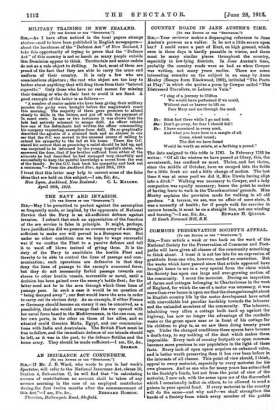THE NAVY AND INVASION.
[TO THE EDITOR Or THE "SPECTATOR..']
Six,—May I be permitted to protest against the assumption so frequently made, or implied, by the opponents of National Service that the Navy is an all-sufficient defence against invasion. I submit that such an appreciation of the function of the sea service is false in principle. It might, perhaps, have justification did we possess an oversea army of a strength sufficient to make our will prevail in a European war. But under no other condition can we hope to wage successful war if we confine the Fleet to a passive defence and tell it to ward off blows instead of giving them. It is the duty of the Navy to annihilate the hostile Fleet and thereby to be able to control the lines of passage and com- munication; such operations are defensive in that they deny the lines of passage to the enemy's armoured force, but they do not necessarily forbid passage towards our shores to other hostile vessels, mercantile or naval, until a decision has been gained over the enemy's battle fleet ; for the latter need not he in the area through which those lines of rasEage pass. In such a case it would be no question of " being decoyed away "; our fleet would leave the area in order to carry out its obvious duty. As an example, if either France or Germany should become an enemy it can be conceived, as a possibility, that she would arrange that the war opened with her naval force based in the Mediterranean, in the one case, on her own ports, in the other on those of her allies, and so situated could threaten Malta, Egypt, and our communica- tions with India and Australasia. The British Fleet must be free to follow, and the immediate defence of our islands should be left, as it was in the past, to the defence flotillas and the home army. They should be made sufficient.—I am, Sir, &c.,
SEAMAN.


























































 Previous page
Previous page